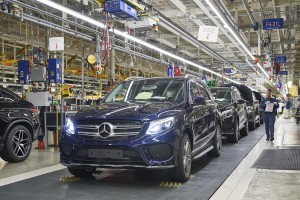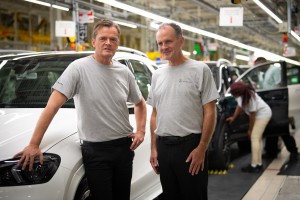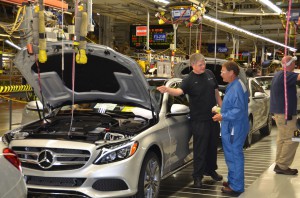Lost in Daimler AG’s announcement that it will lose $1.69 billion during the second quarter this year is the fact the company plans to stop making Mercedes-Benz sedans at its plants in the U.S. and Mexico.
Daimler said the group’s earnings before interest and taxes represented a loss of 1.68 billion euros, or $1.89 billion, which was better than the expected loss of 2.07 billion euros, or $2.33 billion, according to a preliminary report. Daimler expects to release a full financial report July 23.
The German automaker is ending production of its Mercedes-Benz C-Class sedan at the plant Tuscaloosa, Alabama. The facility will produce just sport-utility vehicles only, it said. Mercedes will now build three models – the GLE, GLE Coupe and GLS – at the plant.
(Daimler seeing red due to second quarter estimates.)

Part of the company’s Q2 loss was tied to expenses related to its Mercedes-Benz plants, including the one in Tuscaloosa, Alabama.
The U.S. plant isn’t the only site seeing production ended. The company also said it will also stop producing its compact A-Class in Aguascalientes, Mexico, to instead focus on the GLB, a newer, higher-margin SUV model. The shift away from sedans to SUVs and crossovers mirrors that of many other automakers seeking higher-profit margin vehicles to sell.
The company’s seen its sedan sales drop in the last year with the E-Class down 1.3% in 2019. The C-Class fell also, sliding 0.9%. The A-Class was the contrarian in the group, posting a 12.3% increase.
Not only is it moving toward making more utes, it’s blurring the line with coupe versions of the GLC and GLE designed to look like a mix between a car and a small sport utility. Other makers, particularly BMW is using a similar strategy.
(Mercedes-Benz kicks off GLE production in Alabama.)
The company noted some of the factors negatively affecting the quarter’s results included 687 million euros, or $768.6 million, in expenses to begin streamlining the company’s global production network and capacity adjustments connected to Mercedes-Benz Cars’ operations in Mexico and the U.S. Those “adjustments” are the move away from sedan production.

Markus Schäfer, member of the Divisional Board of Management Mercedes-Benz Cars, Production and Supply Chain, and Jason Hoff, president and CEO of MBUSI, kick off GLE production in Alabama in 2018.
Overall, the company outperformed analysts’ expectations thanks, in part, to the better-than-expected recovery in some markets and a strong June performance. The adjusted EBIT for Mercedes-Benz Cars and Vans and Daimler’s industrial free cash flow, which was positive, for the second quarter of 2020 are also above market expectations, Daimler said.
Ola Källenius, chairman of the Board of Management of Daimler AG and Mercedes-Benz AG, said Daimler’s deployment of extensive cash preservation measures plus the favorable demand-driven development of working capital combined to deliver positive Industrial Free Cash Flow in the second quarter.
(Hoping to head off tariffs, German official highlights U.S. investment during Alabama trip.)
“This has been a complex quarter,” Källenius said. “We took proactive decisions on costs and spending and focused intensely on working capital management. We were then able to seize opportunities allowed by the market recovery, thanks to our compelling product line-up. We also announced key strategic partnerships in electrification and vehicle software during the quarter that position us well for the future.”

